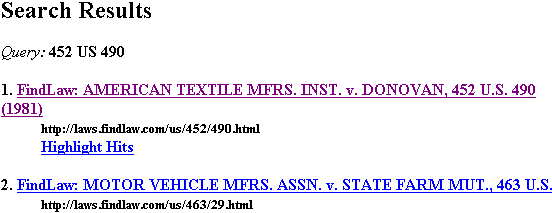
| Deciphering Court Case Citations |
| Law Resources Online: |
| FindLaw |
| Lexis-Nexis Academic |
| Legal Information Institute |
| Back to Main Environmental Research Page |
Much in the same way that Yahoo! attempts to be a "one stop" subject directory for the internet as a whole, FindLaw tries to be a comprehensive subject directory of legal information on the internet. In addition, Findlaw provides its own information such as a database of U.S. Supreme Court opinions from 1893 onwards. Unlike Lexis-Nexis which is limited to Bucknell patrons through our subscription, FindLaw is freely available to anyone and does not require a subscription.
NOTE: For this class, you can use FindLaw to search for the text of cases tried in the U.S. Supreme Court. FindLaw also contains cases tried in the U.S. Court of Appeals, however Lexis-Nexis Academic Universe has more complete holdings and is much easier to use. Therefore, I will not be covering how to find cases from the U.S. Court of Appeals from FindLaw in this website. In addition, FindLaw only indexes Supreme Court cases from the United States Reporter (abbreviation - U.S.). If you are looking for other cases online try using the Lexis-Nexis Academic database instead.
Once at FindLaw you will see a screen that lists the different categories of material available through FindLaw. You will also see a search box that can be used to find the case you are looking for (see below):

To find Supreme Court cases, click on the grey box with the black triangle pointing down on the right hand side of the box with FindLaw Guide written in it. Select Sup Court 1893+ from the list of options. Enter the citation or the exact name of the case that you are looking for. Using the example of American Textile Man. v. Donovan 452 U.S. 490, the screen would look like this:

Click on the search button after you have entered the appropriate information.
NOTE: FindLaw searches the full text of the case for the information you enter into the search box. Therefore it is not a good idea to search for words in the name of the case unless you are sure of the exact name of the case as you may retrieve unwanted results otherwise. Searching for "American Textile Man. v. Donovan", for example would not produce the correct results as the actual name of the case is "American Textile mfrs. inst. v. Donovan". In general it is better to use the citation to search for a case, if you have it, although you may still receive unwanted results as your case may be mentioned in the text of other cases.
Once FindLaw has finished searching you will see a screen like this:

Clicking on the highlighted title of the case will take you to the full text of the case. You can print out a copy of the case by clicking on the print button in your browser's toolbar (at the top of the screen).